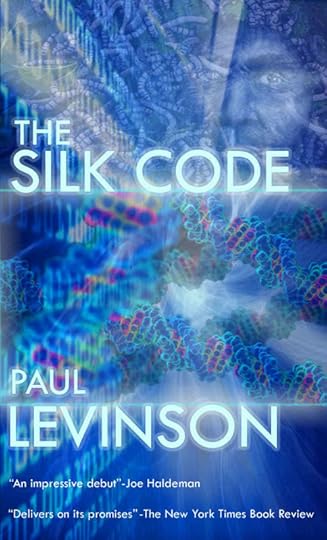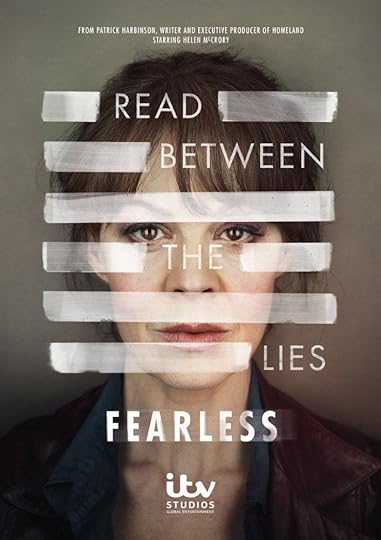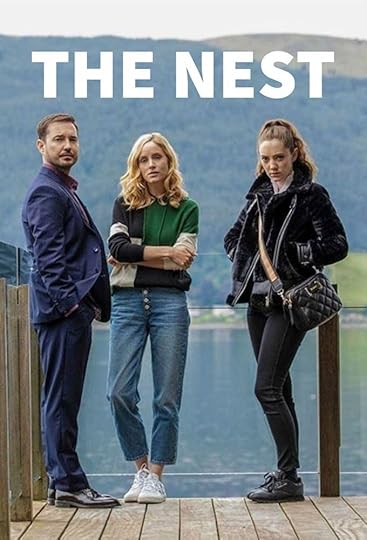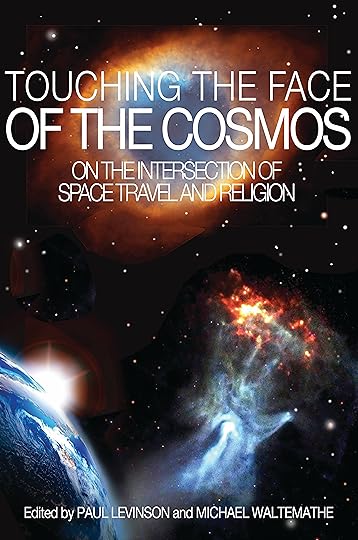Paul Levinson's Blog: Levinson at Large, page 123
August 9, 2020
Rebecka Martinsson: Two Very Different, But Excellent, Seasons

My wife and I just binged two seasons of Rebecka Martinsson on Acorn via Prime Video, and loved it. The narrative takes in the northern-most town of Sweden, Kiruna. Rebecka comes from there, is working in Stockholm when the series begins, and goes back home, changing from being a high-class corporate lawyer to a country prosecutor. The transformation is not easy for her - her mother committed suicide and her father died in a car accident. She does find love there - but not easily - and a great group of police to work with.
But before I tell you anything more, here's a kicker: Ida Engvoll plays Rebecka in the first season (see's in the picture above). She brings an incredible combination of sweetness, spunk, evanescence, and melancholy to the role. And ... she's gone in the second season. Sascha Zacharias, who played a minor character in the first season, plays Rebecka in the second. And she does a pretty good job, but ...
I read somewhere that Truffaut or Godard or some legendary French filmmaker once fired an actress in the middle of a movie and hired someone else to play her character. He said the audience would never notice. I have no idea if they did. But I do recall when Dallas the TV series brought in a new actress to play Miss Ellie (Donna Reed replaced Barbara Bel Geddes) and that was a complete travesty. I have no idea why Rebecka Martinsson took such a risk. And though I very much enjoyed the second season, I missed Engvoll.
By the way, Rebecka Martinsson, a propos its location, is very much Nordic Noir - with a vengeance. Major, likeable characters are prone to die, and, jeez, a little baby is frozen to death in a backseat of a car. But that's leavened with wisecracks and repartee - the best coming from Anna Maria Mella, a chief detective or whatever the Swedish title, very well played by Eva Melander - and the scenery is downright breathtaking.
We'll definitely be watching the third season. I just hope the producers don't pull another Dallas on us.

We Hunt Together 1.1: Compelling Pairs

A different kind of detective show, just on Showtime: We Hunt Together.
How is it different? British - well, there are lots of those. Somewhat unusual format: About equal time to the build-up to a murder, that happens three days before the detectives begin to investigate. That's interesting, but not enough to make We Hunt Together compelling.
Here's what does: the characters, who come in pairs, a man and a woman, who do the murder, and a man and woman who investigate. In both cases, the men are black. In the case of the killers, he's seeking some sort of refugee status in the UK, from Africa. He has both a gentleness and a violent streak. His partner in crime is a blonde, who works as a telephone sex operator, in at least one of her jobs. As for the detectives, the guy is gentle, too. His partner, the woman, is something of a hard-ass, or at least more seasoned in homicide investigations. He, by the way, is her boss, That, to me, is an interesting set of characters, who have a shot at being compelling.
The ambience is evocative, too - gritty, smoky, boozy, druggy. Someone who sounds like Amy Winehouse (and for all I know, is) sings "Will You Still Love Me Tomorrow" as the murderers dance, and the song plays under (or is it over?) the closing credits. One of the best applications I've heard of that Goffin and King masterpiece.
So I'm in - at least to the extent that I'd watch the next episode of We Hunt Together tomorrow, but I'll settle for next week, and tell you sooner or later if I love it.

Into the Night: The Lethal Sun

In the old days, they used to have something called B-movies. They were intended to accompany the A-movie, the main attraction, in the double features that played in neighborhood movie houses, before television came along and ate their lunch and closed them down. Many of those B-movies were quite enjoyable, but they weren’t exactly Oscar material. I don’t think there were any B-television shows, certainly none on cable and none on Netflix, Amazon video, and other streaming services. But if ever there were a streaming television series that felt like a B-movie – in this case, a six-episode movie serial – it would be Into the Night, which started on Netflix in May 2020.
The set-up is quite simple: our sun has turned lethal, literally. A band of hapless, but fortunately talented, people end up on a plane hijacked in Brussels. It has a pilot, wounded in the hijacking, who is fortunately still able to fly his plane, before the deadly morning sun arrives. The challenge: fly west, or further into the night, and avoid the sun – as well as their own dangerous impulses – until they can find a safe place to shelter, if there is one left on the planet. To add more interest, the passengers all come with serious psychological baggage of one kind or another. And to add insult to injury, the murderous sunlight also ruins the food, making oranges taste like “chalk,” and other fruit like “toilet paper”.
The premise, that the sun’s out-of-whack polarity has made its rays into killers, has zero scientific plausibility, so far as I know. So how, then, did I come to very much enjoy this series? I’m reminded of what my late and great editor at Tor Books, David Hartwell, once told me about readers of science fiction: they will accept a total of one big preposterous element in your story, and if you’re rigorous in adhering to your premise and its implications for the rest of your narrative, they can still love your work. Into the Night is often riveting proof that the same pertains to binging a science fiction television series.
My favorite part of the series was its intrinsically, blatantly European flavor. The language is French (with English subtitles) – one of the two languages officially spoken in Belgium – and the major characters are Belgian, Italian, Turkish, and Russian; even some Scottish accents play a supportive role. There are bad guys and good guys of both genders, spurts of heroism, altruism, cleverness, as well as sheer selfishness and stupidity. In addition to the life-and-death context that propels the entire narrative, there are ample micro life-and-death situations that the individual characters find themselves in, and this makes Into the Night tough to stop watching. I watched all six episodes in one sitting.
And as I was watching, I was thinking that, given that this series takes place on the very edge of the end of the world, our time of the harrowing pandemic off-screen makes this an ideal time to watch Into the Night. Is there any research in psychology to the effect that during the time of a global crisis, watching a story about an even worse kind of global crisis is a good way to kind of get your mind off the real one? I don’t know, but I wouldn’t be surprised if that was a contributing factor in why I enjoyed the series.
I hadn’t laid eyes on any of the actors before, and had never heard of either the book on which the series is based, The Old Axolotl, the 2015 novel by Polish author Jacek Dukaj (translated into English in 2017), or of the “creator” of the series, Jason George, who also gets the writing credit. That writing, by the way, is actually pretty sharp, and sometimes serves up a winning hipness and humor; as when one character, trying to buck up another character’s desperate attempt to bring a plane safely down on a runway with no prior piloting experience, while using a YouTube tutorial, tells her, “If we land, I’ll leave a good review.” The first-time pilot, Sylvie, has the most compelling backstory, and is well played by Pauline Etienne. All right, I guess I’ll admit that most of the other characters have interesting backstories, too, though in aggregate this band brought together against the apocalypse, cut off from the world they have no chance of saving, seem a tad too familiar, maybe because they remind me of Lost.
But the ending leaves plenty of room for a sequel, and I’ll be happy to see it.
First published in my new column, The Other Reel, in Future SF, July 2020.

Why I Think America Is Not Permanently Unraveling
Welcome to Light On Light Through, Episode 135, in which I rebut Wade Davis's claim in a recent essay in Rolling Stone that America's decline is irreversible.
Further reading
Wade Davis's The Unraveling of America, in Rolling Stone, 6 August 2020 my written response, Why I Disagree about the Unraveling of America
Paul Levinson's books ... Paul Levinson's music
August 8, 2020
Why I Disagree about "The Unraveling of America"
Canadian anthropologist Wade Davis posted a savvy article in Rolling Stone, entitled The Unraveling of America. Its thesis that America's generally atrocious handling of the COVID-19 pandemic, under our "buffoon of a president," laid bare a decay and decline that already was well underway, in racism and income inequality, is well-evidenced and well-argued, and undeniable. But I disagree with Davis on two important points, one historical, the other up and coming.
1. Davis says Americans elected Trump. That's not quite the case. Hillary Clinton won the popular vote by three million votes over Trump, which means Americans elected her not Trump president. It was the antiquated, anti-democratic Electoral College - our inane way of electing a President - that put Trump in office.
2. Davis concludes by observing that "even should Trump be resoundingly defeated [in November], it’s not at all clear that such a profoundly polarized nation will be able to find a way forward. For better or for worse, America has had its time." I agree that the future is always opaque, or not at all clear. But it follows that I don't see it as a certainty that "America has had its time". If the Democrats take back the White House and the Senate, the United States could have a progressive government akin to what FDR had in the 1930s.
That government, back then, got us out of the Great Depression, and then went on to crush the Nazis. It did that, even though America still suffered from racism, sexism, and extreme income inequality, in just all about ways worse than ours. It did that with a far less effective community-building media system than we have now -- i.e., no television and no Internet. I think there's every reason to think that the election of Joe Biden to the Presidency, and a Democratic majority to the Senate, could indeed reverse most of the damage that Trump has done, and result in America being a better leader of the world than it ever was.
But all of that depends on Americans getting out and voting or mailing out their ballots in November.
August 6, 2020
Three Absentias
Welcome to Light On Light Through, Episode 134, in which I review the three seasons so far of Absentia.
Read the reviews in this blog:
Absentia 1: In Your Face and Worth Watching Absentia 2: Even More There than the First Season Absentia 3: Adrenalin and RelevancePaul Levinson's books ... Paul Levinson's music
Absentia 3: Adrenalin and Relevance

The third season of Absentia was up on Amazon Prime Video last month. I liked it the best of the three seasons so far because, well, I like James Bond type stories more than a vanished member of the family comes home after six years of missing, even if she is a high-powered FBI agent.
The new season picks up right after the second season ended, and quickly pitches us into international espionage and subterfuge, with a searingly all-too-currently relevant theme: the bad guys want to unleash a virus upon the world, with a view towards getting rich distributing an antidote which they also have in their possession. It turns out that Emily was missing for six years because she was kidnapped by this group, which also has other (maybe) related bio "research" at work, including (I think) developing some kind of super-warrior army they can use.
I'm putting in those provisos - "maybe," "I think" - because these connections are still not brought into completely clear focus. But that's ok, because the action is so quick and powerful you barely have time to think about the ultimate underpinnings. There's also an excellent development of characters, in Emily's family and beyond. In the first two seasons, her brother played an important role. He plays a somewhat significant role again, but not as much as Emily's father Warren and her son Flynn, very well played by Paul Freeman and Patrick McAuley. Let's hear it for multi-generation de facto commandos!
Nick also plays a very different role in this third season, becoming the one who's kidnapped, in absentia, pursued relentlessly by Emily. She's helped by Cal, a not completely trustworthy partner, at least not by Emily, but very effective fighting for her and alongside her. One of my favorite scenes is how the two get the drop on a group of brutal bad guys and throw them off a hurtling train in the middle of Europe. Stana Katic is just great as Emily, as is Patrick Heusinger as Nick and Matthew Le Nevez as Cal.
Speaking of Europe, most of the action takes place in Austria and Germany, and the combination of that and the labs filled with experimented-upon bodies adds a definite Nazi flavor to this. I found that both appropriate and a welcome departure from ISIS or Russia being the root of the villainy. Indeed, immigrants from the Middle East are preyed upon by the nefarious bio-tech operation, and they emerge as heroes in this story, with Rafiq (well played by Adam Hussain) working with Nick and Emily to free his mother and the other prisoners from the sinister labs.
I give Absentia 3 my highest recommendation, for its non-stop action, social relevance, human relationships, and espionage puzzles. And back to that Bondian quality that I like: it even has a memorable villain enforcer, Dawkins, played just right by Geoff Bell.
See also Absentia: In Your Face and Worth Watching ... Absentia 2: Even More There than the First Season

Paul Levinson's books ... Paul Levinson's music
August 5, 2020
Fearless: Yes, and Boundless

Shows about lawyers defending clients wrongly accused of murder are a dime a dozen, on both sides of the Atlantic. So are espionage shows in the U. K., in which the Americans are the bad guys. Fearless had both of these characteristics. The opening credits feature Margaret Thatcher, who was best friends with Reagan; Tony Blair, who supported Bush's ill-conceived attack on Iraq; and even Donald Trump, who is a dangerous lunatic in just about any book. But the British lawyer, Emma Banfield, was played by Helen McCrory, who was great on Peaky Blinders, so how could I resist watching this 2017 mini-series?
And I'm glad I did. As Banfield defends her client, Kevin, stewing in jail for a murder he didn't commit because he confessed to it, she and we unravel a complex plot with twists and turns and complexities that will keep you guessing until near the very end. And, yes, although the Americans are mostly behind it, at least the lead American, Heather, is played by an American actress, Robin Weigert (all too often in these British shows you have an American character played by a British actor doing his best Robert Mitchum impersonation). And you also have characters undergoing refreshing and justified transformations, such as an opponent turning into an essential and reliable ally.
But the heart of the series is McCory's performance as Banfield, who manages to be tough as nails but always vulnerable, and at the same time. Or, to shift the metaphor, Banfield wears her heart on her sleeve all the time, even when she steps into the ring, which is also all of the time. That takes a lot of skill to pull off - in acting as well as reality - and McCrory does a fine job of it.
So is there a second season, with another exploit for Banfield, and further development of her difficult life? Well, there should be, but I can't find it. So I'll end this by making my customary plea to Netflix, Prime Video, and Hulu: pick this is up, if the original bankrollers are not up to it. Emma Banfield is a memorable character, and we'd like to see more of her.

Paul Levinson's books ... Paul Levinson's music
August 4, 2020
The Nest: Scottish Noir and Bio-Ethics

The Nest concluded its 5-part mini-series Acorn run on Prime Video last night. Top-notch Scottish noir, if there is such a thing, and there should be.
The story involves a wealthy couple who live in a gorgeous home in the Glasgow area on Loch Long, desperate to have a baby. So desperate, they're down to their last egg, and are seeking someone, anyone, to carry their baby to term. So desperate, they choose a young woman, barely of age, who (we learn in the course of the mini-series), when she was just a "wee lass” of eleven, killed a pregnant woman and her baby.
The story veers from the couple deciding if they want to go ahead with this, to worrying when the surrogate mother gets drunk, to finding out just what happened when she was eleven, to ultimately dealing with the profound ethical issue of who should have the right to be the parent of this child, the producers of the embryo or the woman who brought the baby to term.
As such, The Nest is more than a noir drama, it is a narrative that portrays and grapples with one of the emerging bio-ethical issues of our age. Martin Compston, who has been so good in Line of Duty, is equally good as the husband/father in The Nest. Similarly Sophie Rundle from Peaky Blinders as wife/mother. And Mirren Mack, whom I haven't seen before, was just perfect as the young woman carrying the baby.
The Scottish scenery, always a pleasure to see in person, was a sight for sore eyes in this time of COVID. But see The Nest for its winning mix of action and ethics.

Paul Levinson's books ... Paul Levinson's music
August 2, 2020
SpaceX Splashdown
Welcome to Light On Light Through, Episode 133, in which I give context to why the SpaceX splashdown today is such a momentous event in lifting our species off this planet.
Further reading: Touching the Face of the Cosmos: On the Interaction of Space and Religion

Paul Levinson's books ... Paul Levinson's music
Levinson at Large
- Paul Levinson's profile
- 340 followers



